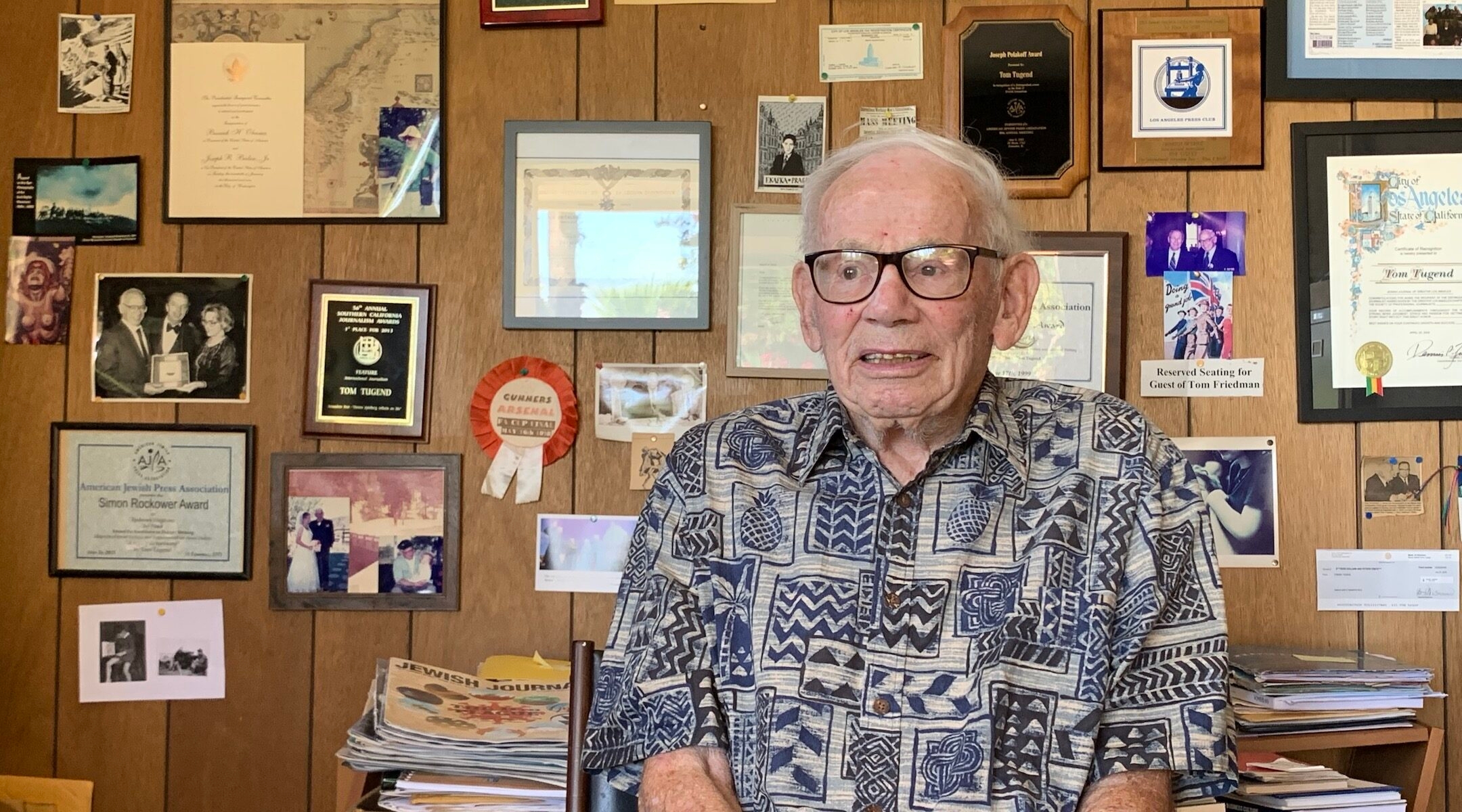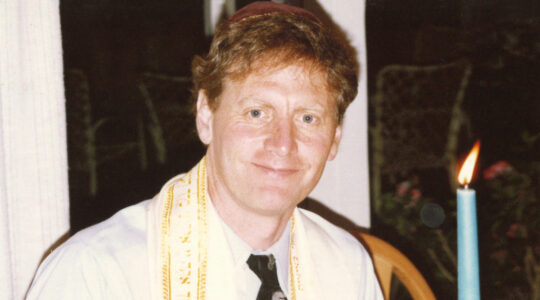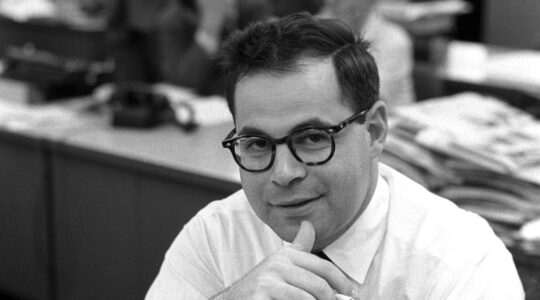(JTA) — It was the kind of story that Tom Tugend loved to tell, except he lived it.
He left Berlin, aged 13, on Adolf Hitler’s birthday, in 1939, driven out by the ideology reflected in the swastikas on the banners fluttering in the streets. Six years later, he was back in Germany as an American soldier interrogating the Nazis who had driven his family out.
“I had been a refugee a few years before,” Tugend told the Jewish Telegraphic Agency in 2021. “They kicked me out, they were the masters. And suddenly they couldn’t be nice enough, and couldn’t do enough for us. And of course, each one, some of his best friends were Jews.”
Tom Tugend, who fought in three wars — two for the United States and one for Israel — spent decades as Jewish media’s gentleman correspondent, covering, among other beats, Hollywood.
He died at his home in Sherman Oaks, California, on Wednesday at 97, his daughter Alina said.
“His authenticity came through to anyone who knew him,” Alina Tugend told JTA Thursday. “He was a hero to many people.”
Tugend was unfailingly kind and soft-spoken, including in an interview last year with the JTA, in which he shared story after story, from firing swastika-emblazoned anti-tank guns in Egypt to his experience facing antisemitism as a young German immigrant in the United States.
Born in 1925, Tugend was raised in a well-to-do German Jewish family. His father, Gustav Tugendreich, a respected pediatrician, understood the danger of Hitler’s rise and left for the United States in the mid-1930s after securing a lectureship at Bryn Mawr College.
When he was able to bring them over, he urged his family to follow him, but life remained good enough in Germany that they resisted until it was almost too late — they left four months before World War II started.
It was Hitler’s 50th birthday, April 20, and the city’s trees and poles were draped with massive swastika banners. “Gee, I mean, they may not like the Jews, but it’s very nice of them to give us such a nice sendoff,” Tugend recalled last year with a laugh.
The transition to life in the United States was not easy. The family encountered antisemitism in their new home.
In eighth grade, for example, Tugend’s class read Shakespeare’s “The Merchant of Venice,” which famously includes Shylock, a Jewish moneylender, as a main character. One of Tugend’s classmates, whom he had considered a friend, raised his hand and asked the teacher, “Wouldn’t you rather buy from an American than a Jew?”
“I don’t generally talk about it because it goes so counter, it sounds almost disloyal that you say I had a more difficult time initially in the United States than I had in Germany,” Tugend recalled.
He was restless, and joined the army when he was 18 — where he found more antisemitism. He was deployed in March 1944 and spent time in Marseille helping the French army fight SS units. When his commanders learned he spoke fluent German, they sent him to that country to interview Nazis.
He returned to the United States in March 1946 but remained unsettled. Two years later he saw an opportunity.
“Since a Jewish state is established only every 2,000 years, I was afraid I might not be around the next time,” he said, so he enlisted in the nascent and notoriously strapped Israeli army, which got its material where it could.
Tugend served as a squad leader in an English-speaking anti-tank unit, where he wound up using German guns that featured large swastikas on the barrel.
When that war ended, Tugend returned to California to complete his journalism degree. That stay was short-lived, too — he was drafted again in 1950 but was spared combat. Instead, he went to San Francisco to edit an Army newspaper.
After Korea, Tugend said, he ran out of wars. He shifted his focus to writing. He spent 30 years working at the University of California, Los Angeles and also had a parallel career in Jewish journalism, starting in 1964. He would go on to write for the Jerusalem Post, the Jewish Chronicle and the Jewish Journal of Greater Los Angeles, and he spent decades as the Jewish Telegraphic Agency’s West Coast correspondent.
Lisa Hostein, the longtime former JTA editor-in-chief and current executive editor of Hadassah Magazine, remembered meeting Tugend on a Jewish press trip to Argentina in 1986. She told JTA last year that Tugend was “always the consummate professional and gentleman.”
Over the years, Tugend was honored by the Greater Los Angeles Press Club and the Society of Professional Journalists. He also received a lifetime achievement award from the American Jewish Press Association.
His last published article was last month in the Jewish Journal of Los Angeles; it was an obituary for Edward Robin, a Los Angeles philanthropist and businessman, who was 80, 17 years Tugend’s junior.
Weeks before his own death, Tugend infused the article with his gentle and generous warmth. “A mere listing of his leadership roles in Jewish organizations worldwide would call for a book-length article,” Tugend wrote about Robin.
Honored at last month’s Jewish Journal gala, which he attended, Tugend never lost his love of writing. “You still get a certain kick in seeing your byline,” he told JTA last year.
Tugend is survived by his wife of 66 years, Rachel, their daughters Alina Tugend, Orlee Raymond and Ronit Austgen, eight grandchildren and one great-grandchild.
JTA has documented Jewish history in real-time for over a century. Keep our journalism strong by joining us in supporting independent, award-winning reporting.






